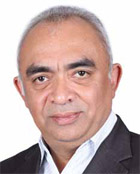With over 700 rooms in the pipeline, in the next few months, IBIS will somewhat double its inventory by the end of 2016. Given that the budget and midscale segment are on a roll, strong supply will help rake up strong revenues for IBIS, said J B Singh. An exclusive:

PRESIDENT & CEO, INTERGLOBE HOSPITALITY
IBIS has done well for itself. Given that the nation is adding larger numbers of aspirational travellers who wish to enjoy a high-class of service and facilities at a reasonable pricing, IBIS has amply found its niche. The company is over ten years old now – which is a joint venture with InterGlobe. InterGlobe being the principal share-holder with a majority holding of 60 percent. J.B. Singh, President and CEO, InterGlobe Hotels believed that the structuring of the joint venture gave them a unique advantage in their operations. “Our experience in tourism, travel, aviation and technology with the pedigree that InterGlobe brings has gone on to partner a top hotel player in the world. That gives us the unique ability to bring on board the best of both worlds. Besides, we have a deep financial commitment to the association,” he asserted.
He credited the success of IBIS, as a brand, to the fact that they were able to develop a product that was best suited for the market, and because they developed their hotels themselves. “We own the design, development and asset, and through our ventures operate them, as well. It has helped us, more than saving on investments, understand the exact needs. I would refrain from using the word save, and say that it has helped us to construct more efficiently, and, make sure that we are enhancing the guest experience at every stage of consumer interaction,” said J B Singh. IBIS had employed multiple means of acquiring land; some were bought right off and some were leased, J B Singh said.
He further substantiated the brand’s positioning by explaining that no other brand could bring about the same level of consistency and the tightness of the product that they did. He said that his main focus was their consumer and they went into great details of various facets such as building and, especially, services. “The way we build our hotels and the class of service that we have put in from fire safety, air-conditioning, guest comfort, acoustics and quality of beds is very detailed. We haven’t seen that being matched, so far. It reflects in the fact that over 50 percent of our clientele are repeat customer,” he stressed. IBIS maintained an average annual occupancy in excess of seventy percent. “It is when we are in midst of a considerable expansion of our inventory,” he said.
Detailing the product,
J B Singh noted that IBIS had employed smartly designed public areas which were very-urban and up-market. “We have good Wi-Fi facilities in the hotel; the lobby, itself has a lot of space where guests can work on their computers. Our menus are well designed; they are pretty standard. Our breakfast offering –which we believe the very key for the guest to stay in a hotel – is a big spread and, is, consistent in all our hotels,” he said. Key location was another crucial factor decided, primarily, keeping in mind high levels of consumer satisfaction. “We do not want anybody to get short changed. We have never compromised on the location,” he said.
To make a budget segment hotel run in profit requires high levels of efficiency in operations and the ability to plug leakages from construction to roll-off. J B Singh told us that, from purely an investment point of view, they had learnt to make their hotels efficient, both, in terms of time and cost. “We understand how much space we need and what sort of technology works best for our hotels, and given the kind of scale we have, it allows us to build efficiently. I can safely vouch for the fact that our construction is more efficient than most others; at, least 30 percent more efficient than others,” he proudly added.
When asked about the market segmentation and IBIS’s share, there in, he called it a tough exercise to collate data, because as an industry there was no total collation. “If I were to give you some indicator, last year the total industry performed at an average occupancy of around 59 percent, but we operated at 70 percent,” he shared. Adding that the budget space and mid-market space were fancy segmentations which the world, at large, was moving away from, he said “peer reviews have become more critical. We have created a space for ourselves in terms of what other budget segments hotels have to offer are far inferior than we offer, and if you look at the other end of the segment, of course, they have bigger rooms and so on, but not in the same pricing. So, we can say with absolute belief that if any customer walks into our IBIS hotels, anywhere in the country, the experience will be very consistent. And, that itself has created the product integrity that it was meant to do.”